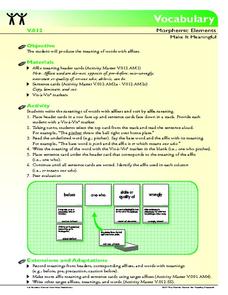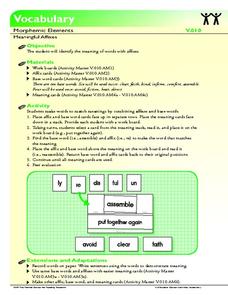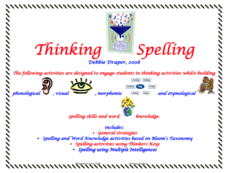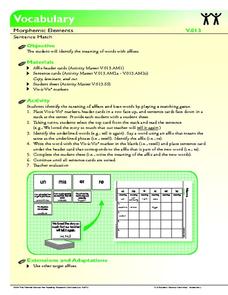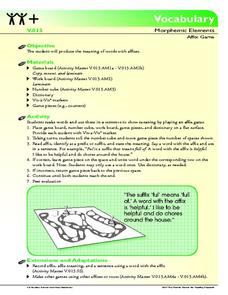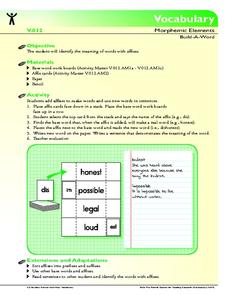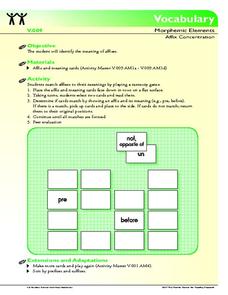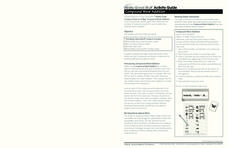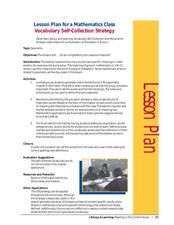Florida Center for Reading Research
Vocabulary: Morphemic Elements, Root-O!
Young readers get to the root of unfamiliar vocabulary with a collaborative learning activity. Given a deck of root word cards and copies of a graphic organizer, pairs of students take turns flipping over cards and brainstorming...
Florida Center for Reading Research
Advanced Phonics: Morpheme Structures, Compound Construction
A phonics lesson focuses on morpheme structures—compound words. Pairs choose letter cards, identify a compound word that starts with that letter and write it on a whiteboard. Extension opportunities include additional practice pages.
Florida Center for Reading Research
Vocabulary: Morphemic Elements, Make It Meaningful
Scholars learn to find meaning in words using affixes with a language arts activity. In pairs, children sort cards with printed sentences that include words with the prefixes mis- and pre- and the suffixes -er, -ness, and -able. Then,...
Florida Center for Reading Research
Vocabulary: Morphemic Elements, Getting to the Root of It
Young readers learn how to get at the root of new vocabulary with this fun language arts activity. When working in pairs, children begin by matching unknown vocabulary words to their Greek or Latin roots. When all the vocabulary cards...
Florida Center for Reading Research
Phonics: Morpheme Structures, Compound Word Puzzles
Putting word parts together to make compound words is like working on a puzzle; when two pieces fit together, you know! Invite learners to work with word puzzle pieces to create 12 different compound words. They record their findings on...
Florida Center for Reading Research
Vocabulary: Morphemic Elements, Meaningful Affixes
Invite learners to determine which affix and base word combinations create new words. This activity allows pupils to play around and create words that match specific meanings.
Curated OER
Thinking Spelling
An etymology resource is packed with suggestions for activities designed to build phonological, visual, morphemic, and etymological spelling skills.
Florida Center for Reading Research
Vocabulary: Morphemic Elements, Root-A-Word
In pairs, scholars draw cards, read the word, and identify its root. Learners place the card on a tree-themed worksheet to sort words by their roots.
Florida Center for Reading Research
Vocabulary: Morphemic Elements, Rooting for Meaning!
Scholars work with root and meaning cards to build vocabulary skills. Playing with a partner, learners read a root, locate its meaning, and cover it with a counter. The first player to cover their board wins.
Florida Center for Reading Research
Vocabulary Morphemic Elements: Word Dissect
Assist pupils as they learn to separate base words and affixes and combine them to determine the meaning of words. Partners practice with cards that include words with affixes.
Florida Center for Reading Research
Vocabulary: Morphemic Elements, Sentence Match
Ask your class to puzzle out the meaning of various affixes. Learners read sentences and develop a new word with an affix to replace the underlined words. They write down the words and help to categorize them by affix.
Florida Center for Reading Research
Vocabulary Morphemic Elements: Affix Game
How well do you know your affixes? Find out how proficient your learners are with a game that requires them to define various affixes and use them to create words that will go into sentences.
Florida Center for Reading Research
Vocabulary: Morphemic Elements: Affix Action
Make a game out of word parts. Pupils work in pairs to advance along the board. One partner reads a sentence from a card, and the other identifies the correct affix that fits with a word in that sentence.
Florida Center for Reading Research
Vocabulary: Morphemic Elements, Build-A-Word
An affix plus a base word equals what? A new word! Invite your class members to discover words using affixes and base words. Learners then write sentences using the real words that they put together.
Florida Center for Reading Research
Vocabulary: Morphemic Elements, Affix Concentration
Ask your class to concentrate their energy on affixes! Pupils match various affixes to their meanings in a memory-style game until all the cards have been gathered.
Florida Center for Reading Research
Vocabulary: Morphemic Elements, Affix Match
Play a quick game of memory, but with a grammatical twist! Learners match the affixes to their meanings.
Curated OER
Morphemic Analysis
Learners analyze content area vocabulary. In this content area literacy instructional activity, students list math words they are unfamiliar with and identify morphemes found in those words that are found in other words. Once they have a...
Really Good Stuff
Compound Word Addition
Sometimes you can add two words together to make one longer word! Practice doing just this with your class with the worksheets and activities included here. The main goal here is to look at an image, name it, and figure out the two words...
Curated OER
Presenting..... Prefixes! Hold Down the Applause, Please!
Fifth graders read and consider a list of common prefixes and their meanings. They complete a worksheet which asks them to read and define a prefix in context. They switch and evaluate each other's papers.
Curated OER
Vocabulary Self-Collection Strategy
Dedicate one or two class periods to creating a class glossary of geometry terms. Many geometry terms also appear in our every day vocabulary, but they have very different meanings. For example, the word gross in geometry is very...
Bright Hub Education
Jabberwocky - A Creative Writing Lesson Plan
Make some sense out of Lewis Carroll's famous nonsense poem "Jabberwocky." After reading through the poem, introduce the word portmanteau and send small groups off to alter the original poem.




